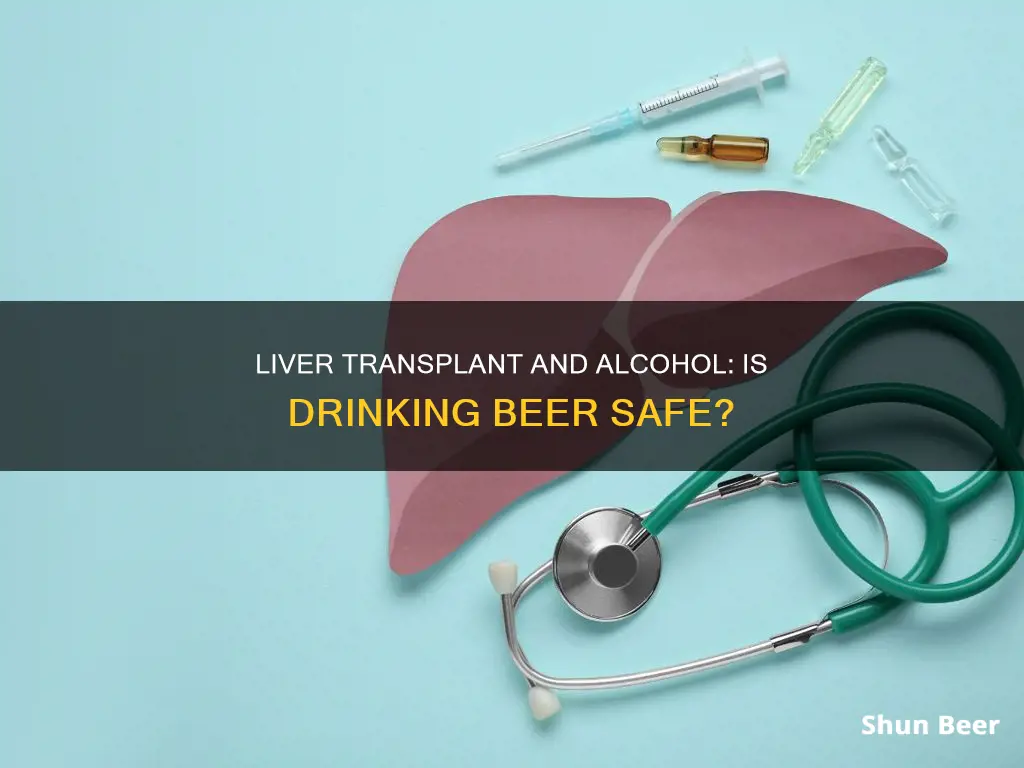
Alcoholic liver disease is one of the most common reasons for liver transplants. However, it is a complicated topic from both medical and ethical standpoints, as it is often seen as a self-inflicted disease. While liver transplants can be life-saving for people with alcoholic liver disease, the high risk of alcohol intake relapse after the procedure is a significant concern. This has been reported to range from 7% to 95%.
The consequences of alcohol consumption after a liver transplant can be severe, including graft damage, graft loss, and decreased survival rates. Therefore, it is generally recommended that people who have undergone a liver transplant abstain from drinking alcohol completely. However, some transplant centres may allow occasional or rare alcohol consumption in moderation for patients whose transplants were unrelated to alcohol.
Can you drink beer after a liver transplant?
| Characteristics | Values |
|---|---|
| Is it possible to drink beer after a liver transplant? | Some doctors say no alcohol at all, but some say an occasional/rare drink a couple of times a year would be ok. |
| Is it safe to drink beer after a liver transplant? | No. Alcohol is toxic to the liver and can interfere with the metabolization of certain medications. |
| Is it common to drink beer after a liver transplant? | Reported rates of alcohol use after liver transplant for Alcohol-Associated Liver Disease range from 8% to 22% and 30% to 40% at 1 and 5 years after the procedure, respectively. |
What You'll Learn
- Alcohol is toxic to the liver and can interfere with medication metabolization
- Six months of sobriety before a liver transplant is no guarantee against post-transplant drinking
- Abstinence is attempted before a liver transplant to overcome addiction issues and allow liver recovery
- Relapse risk factors include anxiety, depressive disorder, and a short duration of sobriety pre-transplant
- Liver transplant recipients should be carefully selected, with priority given to those with a high probability of success

Alcohol is toxic to the liver and can interfere with medication metabolization
Alcohol is a toxin that can damage liver cells even in healthy individuals. After a liver transplant, drinking alcohol is even more dangerous as the transplanted liver won't filter it as effectively. Alcohol is also known to interfere with the metabolization of certain medications, including immunosuppressants, which are vital for preventing rejection and organ failure.
Alcoholic liver disease (ALD) is one of the most common reasons for liver transplantation. However, it is a controversial topic from both medical and ethical perspectives. On the one hand, ALD is often considered a "self-inflicted disease," and there are concerns about the high risk of alcohol intake relapse after transplantation, which can lead to graft damage and loss, as well as decreased survival rates. On the other hand, studies have shown that early liver transplantation for acute alcoholic hepatitis can have promising results, especially in carefully selected patients.
The selection criteria for liver transplantation vary among centres. Many centres require six months of complete abstinence from alcohol before considering a patient for transplantation. This period of abstinence aims to address addiction issues and allow for spontaneous liver recovery. However, research suggests that even with this requirement, there is no guarantee against post-transplant drinking.
The decision to allow alcohol consumption after a liver transplant should be made in consultation with a medical professional, as it depends on various factors, including the reason for the transplant, the patient's commitment to abstinence or controlled drinking, and the presence of a strong support system. Some transplant recipients may be advised to completely abstain from alcohol, while others may be allowed an occasional drink or two, but excessive drinking should be avoided. It is important to note that "non-alcoholic" beers may still contain some alcohol, and even small amounts can be harmful to a transplanted liver.
Beer After Work: Why Do I Always Crave It?
You may want to see also

Six months of sobriety before a liver transplant is no guarantee against post-transplant drinking
Alcoholic liver disease (ALD) is one of the most common reasons for liver transplantation. However, it is a complicated topic from both medical and ethical standpoints, as it is often considered a "self-inflicted disease". The majority of transplant programs require six months of complete abstinence before transplantation, with the goal of allowing spontaneous liver recovery and addressing addiction issues. Nevertheless, research shows that such abstinence does not guarantee against drinking after the procedure.
The six-month abstinence rule has been criticised as lacking scientific evidence and has been the subject of controversial discussions. It is argued that most patients with severe alcoholic liver disease will not survive the six-month period of abstinence, and thus, liver transplantation should be considered regardless of pre-transplant abstinence. This is supported by data from various studies that challenge the six-month rule, while also showing excellent survival outcomes for selected patients with severe alcoholic hepatitis who did not respond to medical therapy.
The selection criteria for liver transplantation should involve a multidisciplinary evaluation, including hepatology, surgical, laboratory, cardiac, and psychological assessments. While complete abstinence is recommended to overcome addiction and promote liver recovery, it is not always a guarantee against post-transplant drinking. Risk factors for relapse include the presence of anxiety or depressive disorders, a short duration of sobriety before transplantation, and a lack of social support.
Reported rates of alcohol consumption after liver transplantation for ALD range from 8% to 22% in the first year and 30% to 40% after five years, surpassing 50% with longer-term follow-up. The first year after transplantation is considered the highest-risk period for alcohol consumption, but it can occur at any time, emphasising the need for ongoing vigilance.
While there is no universal consensus on how to monitor alcohol use after transplantation, it is generally recommended to query all transplant recipients about alcohol use at every post-transplant visit, supplemented by random biochemical testing to detect covert drinking. Although brief periods of limited alcohol use after transplantation have not been shown to have negative consequences, sustained alcohol use leads to worse outcomes, including death. Therefore, the purpose of monitoring alcohol use is to allow early detection and prevent a slip from becoming sustained alcohol consumption.
The Beer Bug Mystery: How Does It Work?
You may want to see also

Abstinence is attempted before a liver transplant to overcome addiction issues and allow liver recovery
Abstinence is a key consideration in the context of liver transplants. Liver transplantation is a common treatment for alcoholic liver disease (ALD), but the procedure's suitability for patients with this condition is controversial from both medical and ethical standpoints. ALD is often regarded as a "self-inflicted disease", and there are concerns about patients returning to alcohol use after transplantation, which could cause problems with their new liver or a recurrence of hepatitis.
To address these concerns, many liver transplant centres require patients to abstain from alcohol for a defined period before they are eligible for a transplant. This is known as the "six-month rule", and it serves two purposes: it allows the liver a chance to recover without alcohol, and it provides an opportunity to observe the patient to verify that they remain alcohol-free. However, this rule has been criticised as lacking scientific evidence and being unfair and inhumane, as many patients with severe alcoholic liver disease will not survive long enough to meet the criteria.
Complete abstinence from alcohol should be attempted before a liver transplant to overcome addiction issues and allow the liver to recover spontaneously. This can help to address addiction issues and increase the chances of a successful transplant. Risk factors for relapse include the presence of anxiety or depressive disorders, a short duration of sobriety before transplantation, and a lack of social support. Family counselling is highly encouraged to prevent relapse, and a strong social support system may decrease the likelihood of relapse.
While some transplant centres strictly adhere to the six-month rule, others take a more flexible approach, considering each patient's unique circumstances and multiple variables, including their psychosocial history, the severity of their illness, their commitment to transplant, and the availability of a sober support system. Some centres may require patients to complete an alcohol rehabilitation programme and demonstrate a commitment to abstinence and transplant before approving them for a transplant.
In summary, abstinence before a liver transplant is important to overcome addiction issues and allow the liver to recover. However, the decision-making process should consider multiple clinical and psychosocial variables rather than relying solely on arbitrary rules like the six-month rule.
Beer Buddy: How It Works and Why It's Awesome
You may want to see also

Relapse risk factors include anxiety, depressive disorder, and a short duration of sobriety pre-transplant
Relapse into substance abuse after an organ transplant is a serious concern, and it is important to identify risk factors to prevent this from happening. According to research, the presence of anxiety or depressive disorders, a short duration of sobriety before the transplant, and a lack of social support are all risk factors for relapse.
Anxiety and depression are common mental health issues among patients with advanced liver disease, and they can increase the risk of relapse after a liver transplant. It is crucial to address these issues before and after the transplant to lower the chances of relapse. Additionally, social support plays a vital role in preventing relapse. Family counseling and involvement in support groups can be beneficial in maintaining abstinence.
Furthermore, the duration of sobriety before the transplant is a significant factor. Studies have shown that longer periods of pre-transplant abstinence are associated with lower rates of relapse. However, it is important to note that simply extending the required period of sobriety may not be sufficient. A multidisciplinary approach is recommended, which includes addressing addiction issues, providing psychological support, and monitoring for alcohol relapses.
In summary, to reduce the risk of relapse after a liver transplant, it is essential to identify and address anxiety and depressive disorders, ensure adequate social support, and promote prolonged sobriety. By doing so, we can improve the chances of successful recovery and reduce the potential harm associated with relapsing into substance abuse.
Dry January: Beer or No Beer?
You may want to see also

Liver transplant recipients should be carefully selected, with priority given to those with a high probability of success
Liver transplantation is a life-saving procedure for patients with end-stage liver disease, but the demand for donor organs far exceeds the supply. Therefore, careful patient selection is critical, and priority should be given to those with a high probability of success.
The selection process typically involves a multidisciplinary team of healthcare professionals, including hepatologists, transplant surgeons, nurses, mental health professionals, and financial counsellors. They assess the patient's medical history, perform various tests and evaluations, and consider specific criteria and contraindications for liver transplantation.
One critical aspect of patient selection is ensuring that the patient's liver disease is irreversible and expected to be fatal without a transplant. Additionally, the patient should have a reasonable chance of surviving the surgery and the perioperative period, and the transplant should provide a significant survival and quality of life benefit.
Absolute contraindications for liver transplantation include severe cardiopulmonary disease, uncontrolled sepsis, active extrahepatic malignancy, acquired immune deficiency syndrome (AIDS), brain death, and technical or anatomical barriers to transplantation. Active alcohol or substance abuse is also typically an absolute contraindication, with most centres requiring at least six months of demonstrated abstinence and enrolment in a substance abuse programme.
Relative contraindications include advanced age (over 65), morbid obesity (body mass index above 40), poor medical compliance, and inadequate social support. However, the specific criteria and contraindications may vary between transplant centres.
The evaluation process also includes extensive testing to ensure that the patient can withstand the physical demands of the surgery and the post-transplant care. This includes laboratory testing, cardiac and pulmonary evaluations, malignancy screening, bone density testing, and a psychosocial assessment to identify potential contraindications and initiate any necessary interventions.
Overall, the goal of the selection process is to identify patients who will benefit most from liver transplantation while balancing the limited supply of donor organs. Prioritising patients with a high probability of success helps optimise outcomes and ensure that this life-saving procedure is utilised effectively.
The Michigan Beer Chair: Engineering a Relaxing Experience
You may want to see also
Frequently asked questions
No. Alcohol is toxic to the liver and can interfere with the metabolization of certain medications. Even \"non-alcoholic\" beers contain some alcohol.
The consequences of drinking alcohol after a liver transplant can be severe. Alcohol intake relapse has been associated with graft damage, graft loss, and even decreased survival.
There is no standard wait time, but doctors typically recommend waiting at least a few years. Even then, it is crucial to drink in moderation and only occasionally.







